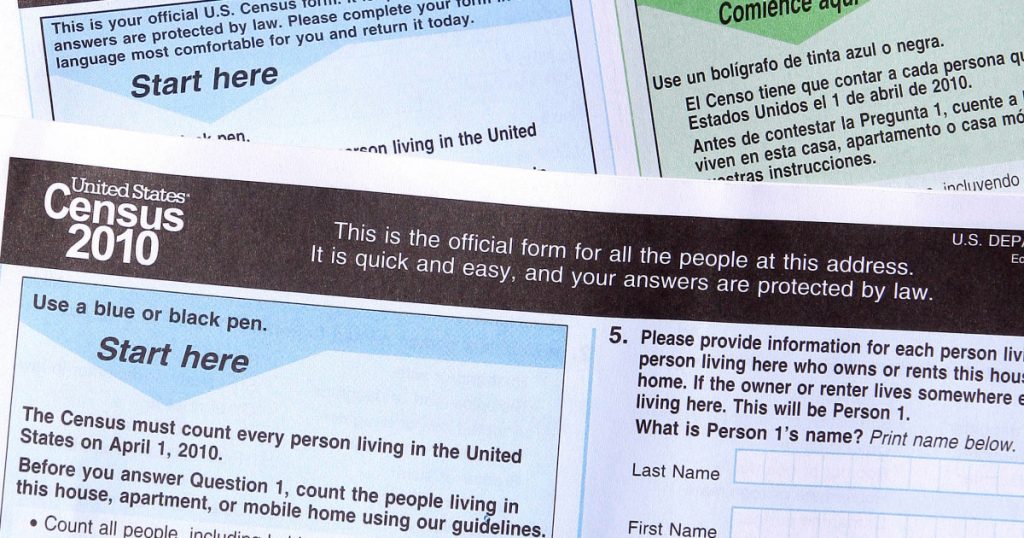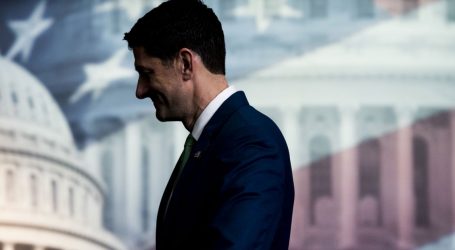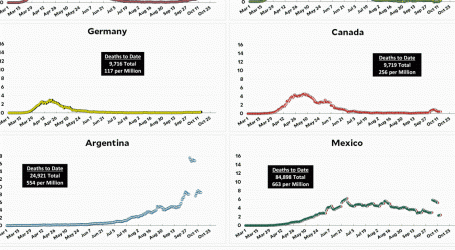Trump’s Pick to Run 2020 Census Has Defended Racial Gerrymandering and Voter Suppression Laws
Copies of the 2010 census form.Ross D. Franklin/AP
Looking for news you can trust?Subscribe to our free newsletters.
In June 2011, the North Carolina legislature hired Thomas Brunell, a professor of political science at the University of Texas at Dallas, to produce a report that would help defend the state’s new redistricting maps. The maps, approved by the Republican-controlled legislature, concentrated black voters, who tended to vote Democratic, into as few districts as possible in order to maximize the number of safe Republican districts. Under the Voting Rights Act, North Carolina had to get Justice Department approval for any voting changes, and so it asked Brunell to provide a justification for the maps.
Brunell argued that clustering black voters into a few districts was necessary to maintain their political influence. Though North Carolina was a racially integrated swing state, where black officials represented majority-white districts and vice versa, Brunell’s report found “there is clear evidence for the presence of statistically significant racially polarized voting” in North Carolina, necessitating majority-black districts. When the maps were challenged in court, state Republicans paid Brunell $300 an hour for research and $500 an hour for testimony as an expert witness.
The strategy worked—for a time. With the new maps in effect, Republicans controlled 10 of the state’s 13 congressional districts after the 2014 election and had a supermajority in the legislature. But in 2017, federal courts struck down two of North Carolina’s congressional districts and 28 state legislative districts, calling the state maps “among the largest racial gerrymanders ever encountered by a federal court.” A unanimous three-judge court in North Carolina said Brunell’s “generalized conclusions regarding racially polarized voting” demonstrated a “misunderstanding” of the Voting Rights Act and “fail to demonstrate a strong basis in evidence justifying the challenged districts as drawn.”
According to multiple reports, Brunell will be appointed deputy director of the US Census Bureau and de facto leader of the 2020 census, which is constitutionally mandated to count every person in America. The census determines the level of representation for state and federal districts, and how $600 billion in federal funding is allocated to states and localities. (In addition to Brunell, the Trump administration has hired Kevin Quinley, a former research director for Kellyanne Conway’s polling firm whose clients included Breitbart News, as a special adviser to the Census Bureau.)
The deputy director of the Census Bureau has historically been a nonpartisan career civil servant. Brunell, a registered Republican, has no prior government experience and a deeply partisan background. He has testified or produced expert reports for Republicans in more than a dozen redistricting cases and has defended new voting restrictions passed by Republicans. His 2008 book, Redistricting and Representation: Why Competitive Elections Are Bad for America, argued that extreme partisan gerrymandering should be the norm because, he claimed, ultra-safe blue or red districts offered better representation for voters than competitive ones.
“It’s breathtaking to think they’re going to make that person responsible for the census,” says former Attorney General Eric Holder.The census, conducted every 10 years, forms the basis for redistricting, and its detailed demographic data is used to implement the Voting Rights Act and other civil rights laws. Voting rights lawyers and longtime observers of the census worry that instead of committing to accurately count every American, Brunell and the Trump administration will use the 2020 census to concentrate power, representation, and economic resources in Republican hands. “He would be a terrible, terrible person to be running the census,” says Allison Riggs, an attorney for the Durham-based Southern Coalition for Social Justice, which challenged the North Carolina maps in court. “In part because he has absolutely no qualifications to do so, but also because he’s a rank-and-file ideologue.” (Brunell did not respond to requests for comment on this story.)
“It’s breathtaking to think they’re going to make that person responsible for the census,” says former Attorney General Eric Holder. “It’s a sign of what the Trump administration intends to do with the census, which is not to take a Constitutional responsibility with the degree of seriousness that they should. It would raise great fears that you would have a very partisan census run in 2020.”
Democrats in Congress have also raised concerns about Brunell’s appointment. “Dr. Brunell has neither the managerial experience nor the non-partisan reputation to fill this position,” Sens. Kamala Harris (D-Calif.) and Gary Peters (D-Mich.) wrote to Commerce Secretary Wilbur Ross on December 21. (The Census Bureau is part of the Commerce Department.) “The appointment of Dr. Brunell would be a significant departure from past practices and would further undermine the Census Bureau’s efforts to increase public trust in the Census. It would also raise questions about the Administration’s intent to comply with the constitutionally mandated requirement to complete an accurate count of the U.S. population.”
Brunell first became acquainted with the census when he was awarded a nine-month congressional fellowship with the American Political Science Association that placed him in the office of the House Subcommittee on the Census in the run-up to the 2000 census. The Census Bureau had failed to count around 8 to 10 million people during the 1990 census—those who didn’t return the form or respond to canvassers at their homes. It proposed statistically adjusting its data in 2000 for a more accurate count, particularly of minority communities that were more likely to be missed. That prompted a furious response from Republicans like Newt Gingrich, who called it “a dagger aimed at the heart of the Republican majority.” Gingrich sued and took the case all the way to the Supreme Court, where he won after the court ruled the Census Bureau didn’t have the authority to adjust its data for redistricting purposes.
The deputy director of the Census Bureau has historically been a nonpartisan career civil servant. Brunell, a registered Republican, has no prior government experience and a deeply partisan background.Brunell worked on the census subcommittee under Tom Hofeller, the Republicans’ go-to redistricting expert, who led the opposition to adjusting the census. “A census that uses sampling and statistical adjustment will be the biggest victory for big government liberalism since the enactment of the Great Society,” he wrote in a memo to Republicans. “These statistical techniques will be used to add millions of ‘virtual people’ to big city population centers, thus increasing the political power and levels of federal program funding in these jurisdictions.”
Hofeller and Brunell were reunited during the 2010 redistricting cycle, when Hofeller, as redistricting consultant for the Republican National Committee, drew maps for Republicans in North Carolina and other states. Roughly half a dozen states hired Brunell as an expert witness to defend those maps. Republicans adopted North Carolina’s strategy throughout the South, isolating black voters in heavily minority districts in order to secure as many Republican seats as possible. Brunell was hired by Republicans in at least three states—Alabama, North Carolina, and Virginia—where courts subsequently invalidated the maps as racial gerrymandering.
In Virginia, Republicans added 44,000 black voters from four different congressional districts to the Third District, represented by Bobby Scott, a black Democrat who’d been easily reelected in the already majority-black district. “Race played a role in drawing the Third Congressional District, but did not predominate,” Brunell wrote in his expert report for the state, saying it was “rather absurd” to argue the district was packed with black voters.
In a rebuttal for the plaintiffs, Michael McDonald, a political scientist at the University of Florida, wrote, “Dr. Brunell believes that it is impossible for any plaintiff to sustain a racial gerrymandering claim.” He cited Brunell’s testimony at another redistricting trial in South Carolina, where Brunell said proving a racial gerrymander “from the outset is almost impossible” and “there’s really no good way of knowing this.”
“In short, Dr. Brunell’s conclusion is preordained,” McDonald wrote. “In his own words, there is no evidence that he would ever agree with that shows race predominated in the creation of a redistricting plan. His expert report is therefore not credible, since he has not fairly weighed the evidence in this case to arrive at his opinion.”
McDonald says that after his rebuttal, Brunell became “suddenly unavailable” and withdrew as an expert in the case, taking a visiting fellowship at a university in Australia. Brunell does not list the Virginia report on his CV. A federal court found that “race was the legislature’s paramount concern” in drawing the Third District and ordered it redrawn.
Virginia’s legislature needed to find a replacement expert, so they turned to the consultant who drew the congressional and House of Delegates maps. He testified that he drew districts for both maps in a manner that was in violation of the 14th Amendment. Thanks Brunell!
— Michael McDonald (@ElectProject) November 21, 2017
In his 2008 book, Brunell admitted that he was making a “provocative argument” by saying that extreme gerrymandering was preferable to swing districts. “Rather than drawing 50-50 districts, we should be drawing districts that are overwhelmingly comprised of one party or the other (80-20 or even 90-10) to whatever extent possible,” he wrote, because that “substantially increases the number of voters who will be both happier with their representative and better served by this representative.” The book’s front cover featured an endorsement from former Republican House Speaker Dennis Hastert, who wrote, “Brunell provocatively challenges conventional thinking about representation and political satisfaction.”
Republicans in the Ohio legislature hired Brunell as an expert witness after the Ohio NAACP challenged the repeal of the first week of early voting in 2014, when 80,000 Ohioans voted in 2012 and African Americans were five times likelier than whites to cast a ballot. “People who want to vote will vote,” Brunell wrote in a report for the legislature. “A marginal reduction in the cost of voting does not inspire thousands of would-be non-voters to cast a ballot. Moreover, early voting diminishes the effect of Election Day as a civil event, which causes some folks who intend on voting to procrastinate so long that they forget to vote altogether.”
Daniel Smith, an expert on early voting at the University of Florida, wrote a rebuttal to Brunell for the Ohio NAACP and its fellow plaintiffs. “This is an unsubstantiated claim,” he wrote. “Dr. Brunell provides no empirical evidence from states where early voting opportunities have been eliminated to support his assertion that these ‘voters will adapt and show up on another early voting day,’ nor does he cite any scholarly literature suggesting that we should expect this to be the case in Ohio.”
Even before Brunell’s appointment, the 2020 census was facing a “perfect storm” of problems, says Terri Ann Lowenthal, the former staff director to the House census subcommittee. The head of the Census Bureau resigned in June, and the Trump administration has yet to name a permanent replacement, which would make Brunell its de facto head. (Even with a director in place, the deputy typically runs the decennial census.) The bureau’s funding has been cut dramatically. Dress rehearsals scheduled for this year to prepare for 2020 were canceled in Puerto Rico and on Native American reservations in North Dakota, South Dakota, and Washington because of a lack of funds. And the next census will rely much more on online responses and less on traditional door-to-door canvassing, potentially leading to dramatic undercounts of certain communities that are less likely to have reliable internet access and more likely to live in neglected areas that can only be reached through concerted in-person canvassing.
The 2010 census failed to count 2.1 percent of African Americans, 1.5 percent of Hispanics, and 4.9 percent of Native Americans living on reservations, while overcounting whites by nearly 1 percent. These errors gave Republican areas more power, representation, and resources than they deserved, and gave Democratic ones less. In California, for example, the census failed to count 1.5 million residents, costing the state $1.7 billion in annual federal funding and depriving it of at least one congressional district.
This undercount of Democratic and minority areas is likely to be much worse in 2020 than in previous years because of budget cuts, a reliance on internet responses, and fears among undocumented immigrants that the Census Bureau will share their personal information with the Department of Homeland Security to initiate deportation proceedings. A draft executive order by the Trump administration proposed adding a question about US citizenship to the census form, which would dramatically depress responses among immigrant communities. In December, the Justice Department wrote to the Census Bureau and requested that such a citizenship question be added.
In the past, Brunell has argued that the census is an inherently political process. “The Census cannot be made antiseptic and apolitical and suggestions for making it so are misguided,” he wrote in a 2001 journal article. “It would be like taking the wax out of crayons. It can’t be done.”
The census begins on April 1, 2020. If it’s done wrong, there are no do-overs until 2030.





